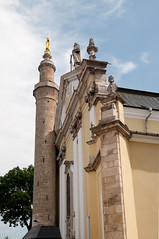
A picture of the Catholic
cathedral at Kamenets-Podolsky, in the Ukraine, an originally Polish city which
is sufficiently far East to have been in the USSR before 1939, rather than in
Pilsudski's Poland. Interestingly, the city was occupied by Muslims at one
point and the cathedral became a mosque. The pillar on the left of the cathedral,
on which stands a statue of the Virgin, was originally a minaret. So far did
Islam extend.
Kamanets-Podolsky is one of the prettiest places I have visited, with lovely baroque Polish churches and an imposing fortress on a rock that reminded me of Luxembourg and the pleasant air of dilapidation that you still get in the Ukraine. Unfortunately, it is also notable for a very terrible massacre of Jews by the Germans during the last war.
Kamanets-Podolsky is one of the prettiest places I have visited, with lovely baroque Polish churches and an imposing fortress on a rock that reminded me of Luxembourg and the pleasant air of dilapidation that you still get in the Ukraine. Unfortunately, it is also notable for a very terrible massacre of Jews by the Germans during the last war.
Kamenets-Podolsky is not very far north of the pre-war border between Romania, which then included the Northern Bucovina, and the USSR. The Northern Bucovina is well worth seeing and I do not know why visitors to the painted monasteries of the Southern Bucovina almost never cross the border. Very few of the locals in the Southern Bucovina have done so. Those who have tend to be people who were cut off for years from family members, when the Northern Bucovina became part of the Soviet Union. Until 1989 borders between friendly socialist countries were the opposite of porous and even now trying to cross can often be extraordinarily difficult, often impossible by bus. Cernauti, or Cernaviti, as it is known in Ukrainian, is a neat, handsome Austro-Hungarian town similar to Satu Mare or Baie Mare, but nothing very extraordinary. A pleasant sleepy place though, that feels like a Romanian provincial town in the late 1990s, a period when Romania was more lovable, before the coming of the satanic malls.
The only traces we found of Chisinau's having been once briefly part of Romania, when we went there for a weekend, were manholes bearing the name of the Romanian national water company and a receptionist at our hotel who said she could speak her father's native language, Romanian, or rather what she called 'limba Moldovana', Moldavian. There are more Romanians there, though, if one looks hard.



No comments:
Post a Comment